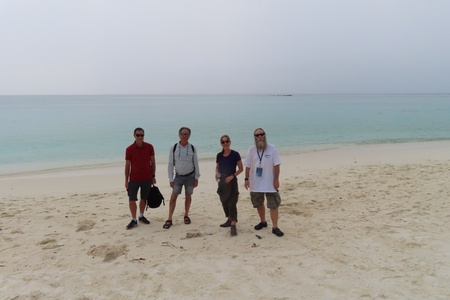Four people from the School of Biological Sciences travelled to the Maldives last month. That was PhD student Yehia Hazzazi, and Professors Adam Price, Jo Smith and Pete Smith. It was for the 2nd meeting of the £17m UKRI funded South Asia Nitrogen Hub (SANH) project that has 40 partner organisations including representatives from all 8 South Asian countries. The project aims to asses and model the impact of nitrogen pollution on the environment in South Asia, and drive improvements via policy change and technical solutions. SANH meetings need to take place in countries where all partners can travel, hence Nepal was the kick off meeting in 2019 and the second meeting (heavily delayed by COVID) was in the Maldives. Well someone has to go there! The 5 day meeting of 130+ participants allowed all the 16 workpackages to assess progress and plan final activities 15 months before the end of the 5 year project. The Aberdeen contingent are working on modelling greenhouse gas emissions and gaseous pollution associated with nitrogen use, assessing where nitrogen is lost from South Asian agriculture, farm level management interventions to reduce environmental loss of nitrogen and genetic solutions to improve nitrogen use efficiency in rice and wheat.
Maldives is famous for being a tropical paradise, destination for wealthy honeymooners. Its also the country most vulnerable to climate change-driven sea level rise with an average height above sea level of 1.7m and a highest point of only 2.4 m. Given that, if we stopped greenhouse gas emissions now, the sea level would still rise 0.88 m by the end of the century, and it would keep rising after that, its obvious to see why climate change matters to the Maldives. Hence the famous 2011 film The Island President featuring a cabinet meeting underwater.
It was a privilege to visit the islands in which the people were so welcoming and friendly, the weather so pleasant and the scenery so beautiful. But SANH had a job to do over there helping to prevent further environmental damage, and we did it well. I hope this justifies the large carbon footprint of the travel to the meeting. And I hope as scientists and as citizens we can help the Maldives stay on the right side of climate change.


